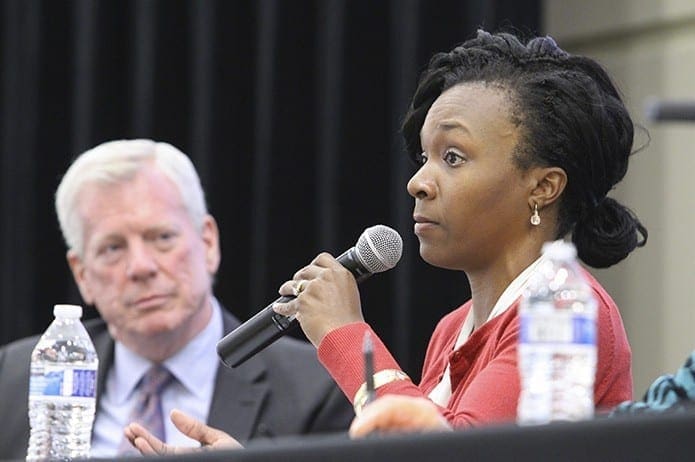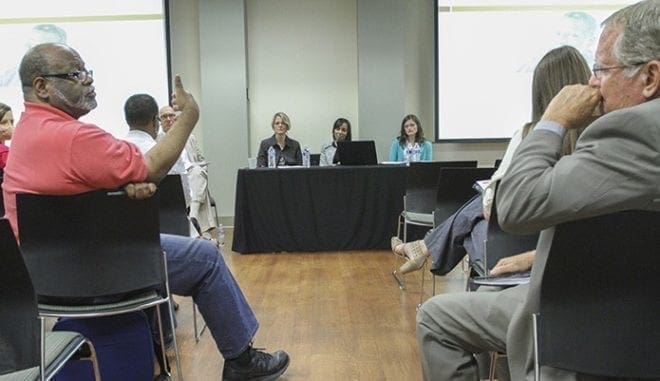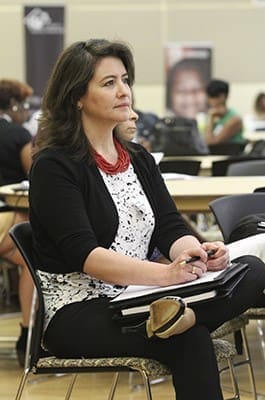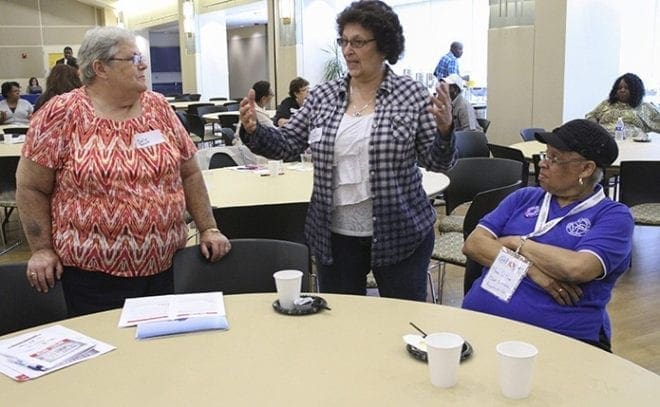 Photo By Michael Alexander
Photo By Michael AlexanderAtlanta
First ‘Poverty Forum’ tackles issues of suburban poor, health care, graduation rate
By NICHOLE GOLDEN, Staff Writer | Published October 15, 2015
ATLANTA—The first Poverty Forum, sponsored by St. Vincent de Paul Georgia, Mercy Care and other nonprofit partners, was about more than raising awareness of the struggles of the impoverished. It served as a spark to find long-term solutions for the poor in Atlanta and suburban communities.
More than 250 people registered for the Sept. 18 event, held at the Georgia Tech Student Center in Atlanta. The forum was part of a larger, three-day Poverty Summit.
“I’m absolutely pleased. We’ve met our expectations,” said John Berry, chief executive officer of SVdP Georgia.

Two attendees dialogue during a workshop discussion on “Improving Health Outcomes in Spite Of Poverty.” Andy Miller of Georgia Health News moderated the panel that included (l-r, at table) Linda Lowe, GLSP health policy specialist, Jada Bussey-Jones, M.D., of Grady Memorial Hospital’s Primary Care Center and Emory University School of Medicine, and Kim Case, APRN, director of quality at Mercy Care. Photo By Michael Alexander
Co-presenters were Meals on Wheels Atlanta, the Center for Working Families and the Center for Family Resources. “We intentionally made it this broad spectrum of agencies,” said Berry.
Organization of the event began last December when SVdP invited 10 agencies to a planning meeting. “We’re going to do it, but we don’t want to do it alone,” Berry told prospective partners.
The forum included panel discussions on suburban poverty; aging and hunger; race, place and poverty; improving health care outcomes in spite of poverty; the “Graduate Marietta!” program; and collaborations that work.
Doug Hooker, executive director of the Atlanta Regional Commission, presented the keynote address. SVdP’s photography exhibit, “Profiles of Poverty,” was on display in Georgia Tech’s Clough Commons. The exhibit brought a human face to the issues discussed at the forum, and guests were encouraged to view the photos.
Peter Harris, a deacon in formation from Transfiguration Church, listened to the panel discussion on suburban poverty and attended the “Graduate Marietta!” session. He and his wife, Kay, have been volunteers with their Marietta parish conference of St. Vincent de Paul for 14 years.
The Marietta school district–run program is designed to better prepare high school students for graduation by providing additional counseling and resources beyond the classroom. For students living in poverty, there are many barriers that can derail graduation or limit access to college.
“I graduated from Marietta in 1968 so I was curious,” said Harris. “Also, I was an educator for 33 years, serving as a high school administrator for 13 years. We need to find alternatives that work at keeping kids in school. This program is a pilot that shows great potential.”
88 percent of metro poor live in suburbs
Cobb County District 4 Commissioner Lisa Cupid spoke on a panel looking at suburban poverty.
A recent Brookings Institution study, “Confronting Suburban Poverty in America,” reported that 88 percent of the poor in the Atlanta area are living in the suburbs without public transit options or the assistance available in the city.
“There’s a prevalence of poverty, but I feel the discussion of it is almost nil,” said Cupid.

Community Assistance Center program director Doris Pereira listens to a discussion regarding perspectives on suburban poverty. The nonprofit, which serves as a City of Sandy Springs, Fulton County Human Services and United Way agency, was founded in 1987 to provide help for those in need. Photo By Michael Alexander
Panelist Barbara Duffy, director of North Fulton Community Charities, said, “We saw 5,000 families last year with some type of emergency need.”
“Poverty is not new to us. Our biggest problem is convincing the folks who live there that we have a problem,” said Duffy.
In addition to emergency aid, the North Fulton organization provides GED tutoring, job coaching and life skills classes.
Cupid said one “unique conduit” in Cobb County is the $1 million set aside each year to support the work of nonprofits aiding the poor. “So it was on somebody’s map,” she said.
The commissioner has worked on issues to help the working poor such as a flex bus transportation program. Those needing to get to work can call to get rides from a flex bus to a fixed bus route stop. “It is an on-demand transit system,” she said.
On the flip side, Cupid believes there are policies—including restrictive zoning laws that are a roadblock against affordable rental properties—that keep the community from getting very far on poverty issues.
“There’s just no appetite to get into the issues that we have. I think politics can be your enemy and your friend,” Cupid told the advocates gathered there.
Maury Wilson represented Phoenix Pass of Rockdale County on the panel. The organization works to help the homeless return to self-sufficiency through providing temporary but stable residences. Recently, the program added eight new apartments for those served.
“It takes a lot of work to position projects. The will is just so strong against it,” he said.
Wilson became interested in poverty when his neighbor faced an emergency crisis and there were no mechanisms in place to help her. He encouraged attendees to befriend members of their local elected bodies to win more cooperation.
“You see your churches and schools step up first because they get it,” said Cupid.
Library computers help homeless
In a small room on the student center’s ground floor, health care advocates attended a panel on improving health outcomes in spite of poverty.
Kim Case, director of quality at Mercy Care, updated the group on the idea of patient portals for the homeless they serve. The portals allow patients to access appointment reminders, the results of lab tests, and other information from doctors.
Case said a survey of their patients indicated that “the majority did have access to the Internet and several times a week” through use of public library computers or smart phones.
The panel also looked at ways to encourage physicians and medical students to become more involved and educate lawmakers against policies that affect access by the poor to health care.
Harris believes there is so much to learn and do with regard to poverty and plans to make it a focus of future ministry work when he completes deacon formation.

Sally Peters, left, and Mary Q. Rice, seated, of St. Matthew Church, Tyrone, and Lynda Mesko of St. James the Apostle Church, McDonough, discuss the challenges of trying to address the needs of impoverished people in suburban areas. All three women work with the St. Vincent de Paul councils at their respective churches. Photo By Michael Alexander
“We have received excellent opportunities to both learn of the causes of poverty, the church’s position on the causes and ways of taking action, and why as deacons we are called to both serve the poor and spread the Gospel, leading others to help do good works,” said Harris. “We have been called to serve the poor by our Lord, and whenever we serve the needy we are serving him.”
The Poverty Forum will return next year. Preceding the forum was an intensive two-day Poverty Institute at the Atlanta Community Food Bank. The presenter was Dr. Donna Beegle, president of Communication Across Barriers.
Harris views the forum and institute as additional ways to network and be more informed of needs, existing efforts, and how to serve within the parish and beyond.
“Awareness is a beginning, but planning and action must follow. It must not be like a wonderful, inspiring homily that we hear but fail to carry out into the community,” said Harris.
Planning based on increased knowledge and understanding makes the difference in finding real answers versus developing better “band-aids,” he said.
“This, to me, is what Pope Francis is calling for and what we all should be working toward,” said Harris. “It’s neighborly love; it’s going beyond responding to need to prevention.”